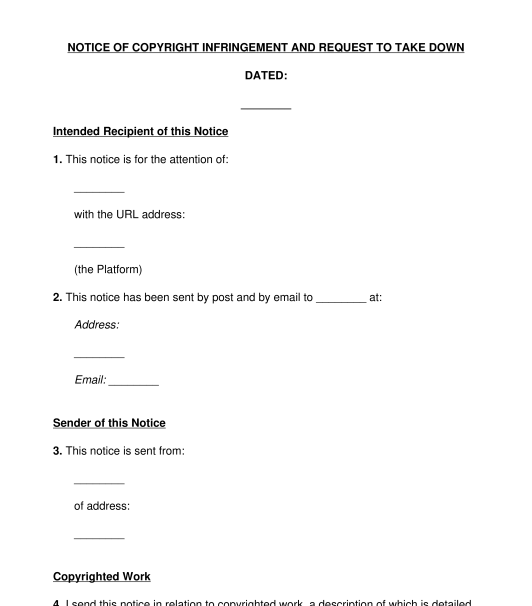 21/11/2025
21/11/2025

Answer a few questions and your document is created automatically.

Your document is ready! You will receive it in Word and PDF formats. You will be able to modify it.

 21/11/2025
21/11/2025
 Word and PDF
Word and PDF
 2 pages
2 pages
This document can be used by a copyright owner or exclusive licensee in the United Kingdom to formally notify an online platform that they are hosting content for a third party (in other words a user of the platform) which amounts to a copyright infringement. This type of request is sometimes called a 'takedown request'.
When to Use this Document
This document is designed for use in situations where:
If the above situation applies, the online platform may become liable for the content. However, it is only possible to argue that an online platform is liable for copyrighted content if it is made aware that the content is unlawful. Furthermore, an injunction to prevent the platform from sharing the content may only be sought through the courts when an online platform has knowledge of the infringement. This notice, therefore, serves the purpose of:
It is important to note that this notice should be sent for copyright infringement only. There are strict rules regarding the making of allegations in relation to other types of infringement (such as trademarks and patents). It is possible for the court to issue penalties against any party making a false or unsubstantiated allegation in relation to those other types of infringement.
If the copyright owner (or exclusive licensee) is making a request directly against another individual who has infringed the copyrighted work, then this document is not appropriate. We are currently working on a document for this type of situation.
Copyrighted Work
Copyright relates to the exclusive right of a person or entity (usually the creator of the work) to carry out specific acts in relation to a protected piece of work in the UK. The specific acts include making copies of the work or making the work available to the public. The law states that copyright can exist over certain types of work. This notice may be used for the following types of protected works:
Copyright is an automatic right which commences upon creation. The right does not need to be registered, although many organisations/individuals choose to mark the work with a copyright symbol ©, together with the creator's name and date of creation.
The length of time which copyright will last depends upon the type of work which has been created and how long ago the work was created. This information can be checked on the government website.
The owner of the relevant work will usually own the copyright to the work. Where an employee creates the work in the course of their employment, the employer will own the copyright. The owner may grant a licence to somebody else to exclusively use the work, and the exclusive licensee may then send the notice as part of their rights under the licence.
Copyright infringement
The law says that copyright can be infringed through primary infringement or secondary infringement.
Primary infringement can include copying the work directly or issuing copies of the work to the public without the permission of the owner, for example. Secondary infringement can include importing an infringing copy of a work into the UK, or possessing or distributing an infringing copy of a work in the course of a business.
The document should be completed using the relevant details. It is important to provide as much detail as possible about the protected work and the relevant infringement.
Once the notice has been completed, it should be signed and sent to the online platform. It is useful to check whether the online platform has a specific copyright infringement reporting procedure which must be followed. The notice can be sent by post, email or both. It is therefore possible to sign the notice electronically or to print the notice and physically sign it.
The notice sets out a specific timeframe for the online platform to take action to address the infringement (i.e to remove/disable the content). The notice also sets out the steps which the sender may take where no satisfactory response is received.
Where no satisfactory response is received from the platform, the sender may wish to argue that the platform has the requisite knowledge of its involvement in the copyright infringement. The sender may therefore wish to consider instigating court proceedings for an injunction and/or damages against the platform.
The main piece of legislation which governs copyright in the United Kingdom is the Copyright, Designs and Patents Act 1988.
The E-Commerce Regulations 2002 (SI 2002/2013) were designed to implement the EU's Electronic Commerce Directive 2000. The Regulations remain part of UK law (known as assimilated law) This is a complex area of law and advice should be sought where required. These regulations are important when determining the question of liability of an online hosting service.
You fill out a form. The document is created before your eyes as you respond to the questions.
At the end, you receive it in Word and PDF formats. You can modify it and reuse it.
Guides to help you
Notice of Online Copyright Infringement - Template
Country: United Kingdom